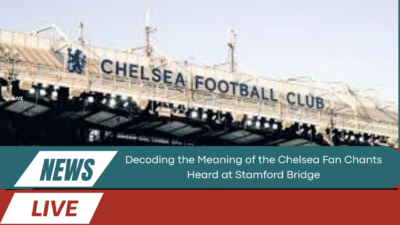Have you ever wondered what the phrase YNWA on Liverpool’s Scarf Mean and why it carries so much weight in football culture? For Liverpool fans, these four letters symbolize more than just a chant—they represent loyalty, resilience, and the spirit of never giving up.
But how did this anthem become the soul of Anfield? Why do supporters worldwide proudly hold scarves with YNWA written across them? And what makes it different from other football songs?
In this article, we’ll uncover the origin of the anthem, its rise at Anfield, and how it continues to inspire fans in 2025. We’ll also connect it to broader football traditions, like who got a yellow card in the Liverpool match, the history of the Premier League, and the culture of global football fandom. By the end, you’ll understand why YNWA is not just sung—it’s lived.
The Meaning Behind YNWA on Liverpool’s Scarf
The letters YNWA are short for You’ll Never Walk Alone, Liverpool’s anthem and motto. On a scarf, they act as a powerful visual statement of identity.
For fans: The scarf is a badge of pride, held high before every game.
For players: Seeing the scarves and hearing the anthem reminds them they carry the hopes of millions.
For rivals: It’s a sign of Liverpool’s unmatched fan unity.
This is why YNWA on Liverpool’s Scarf Mean more than decoration. It represents belief, solidarity, and the timeless spirit of Anfield.
The Origin of “You’ll Never Walk Alone”
From Broadway to Football Terraces
“You’ll Never Walk Alone” was first written in 1945 for the Broadway musical Carousel. Its uplifting lyrics about hope and perseverance struck a chord in post-war Britain.
Gerry and the Pacemakers and Liverpool
The turning point came in 1963 when Gerry and the Pacemakers, a Liverpool band, released their version of the song. It topped the UK charts, and fans quickly adopted it. The Kop began singing it every match, and soon it was inseparable from Liverpool’s culture.
For a broader look at how English football culture evolved, check out the detailed Premier League history.
How YNWA Became the Anfield Anthem
The First Time YNWA Was Sung at Anfield
In the early 1960s, the Kop embraced the song wholeheartedly. Unlike other chants, it was emotional and inclusive, not confrontational.
Emotional Impact
Players often say the anthem boosts their confidence before big matches.
Fans describe goosebumps when the stadium sings as one.
Commentators call it the most moving football anthem in the world.
This powerful tradition continues today, making Anfield one of football’s most iconic stadiums.
YNWA as a Symbol of Unity and Identity
Shared Identity Among Liverpool Supporters
YNWA unites generations of Liverpool fans. Whether you are at Anfield or watching thousands of miles away, the song reassures you that you belong to a community.
Global Recognition
The anthem resonates far beyond Merseyside:
In Asia, fans gather in pubs singing YNWA together.
In Africa, supporters’ clubs use it as their motto.
In the Arab world, platforms like show how digital streaming spreads the anthem globally.
This global reach is why Liverpool’s fan base is considered one of the most passionate in football.
Comparing YNWA with Other Football Songs
Best Football Songs Across Europe
Football has many anthems:
“Blue Moon” (Manchester City)
“Glory Glory Man United” (Manchester United)
“Seven Nation Army” (Italy’s national team)
Why YNWA Stands Out
Unlike these songs, YNWA is not just celebratory. It’s comforting in loss, uplifting in hope, and timeless in message. That’s why it’s ranked among the best football songs in history.
YNWA in Modern Football Culture
Scarves, Banners, and Matchday Rituals
Even in 2025, scarves remain central to Liverpool’s matchday traditions. The ritual of raising them during YNWA is symbolic—showing the connection between past, present, and future.
Influence Beyond Football
YNWA has appeared in films, charity events, and political rallies.
It symbolizes resilience in times of tragedy, far beyond football.
Streaming platforms and free sports apps now bring these traditions to younger generations worldwide.
Controversies and Misconceptions Around YNWA
Misuse by Rival Fans
At times, rival supporters mock the anthem. Yet, Liverpool fans embrace it as a badge of honor.
Debates About Football Anthems
Some argue anthems are outdated, but YNWA continues to thrive because each new generation of fans finds meaning in it.

Conclusion
In 2025, the anthem is stronger than ever. Every match at Anfield begins with scarves raised and voices united. Fans don’t just sing YNWA—they live it.
When you see YNWA on Liverpool’s Scarf Mean, remember: it’s not just words. It’s a promise that no fan, no player, and no community member will ever stand alone.
FAQs
Q1: What does YNWA on Liverpool’s scarf stand for?
A: It stands for You’ll Never Walk Alone, Liverpool’s anthem and motto.
Q2: Who made YNWA famous at Anfield?
A: Liverpool band Gerry and the Pacemakers in 1963.
Q3: Why do fans hold scarves during YNWA?
A: To symbolize unity and show support before every match.
Q4: Do other clubs sing YNWA?
A: Yes, clubs like Celtic and Borussia Dortmund also sing it.
Q5: How has YNWA influenced modern football?
A: It became a universal anthem of hope, inspiring fans worldwide.










